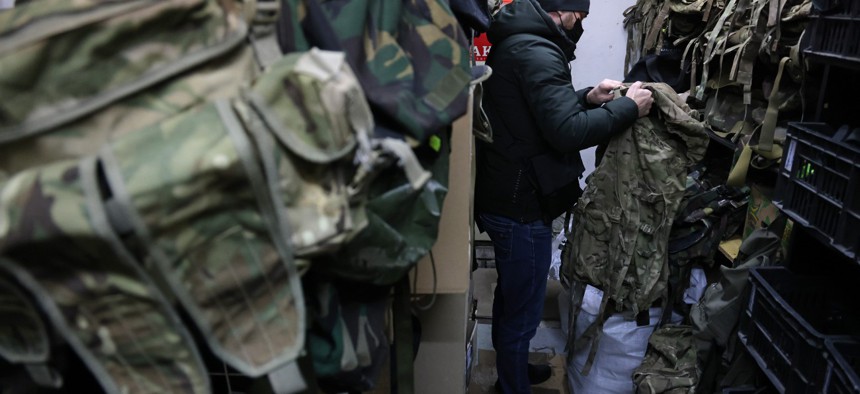
A customer inspects a camouflage backpack in the military surplus shop of Andriy Stovbyha on January 24 in Kyiv, Ukraine. Stovbyha, who sells military surplus boots, clothing, sleeping bags, backpacks and other accessories, says he has seen a sharp increase in the number of customers at his shop since Russian troops began massing at Ukraine's borders in December. Sean Gallup/Getty Images
State Department Authorizes Some Federal Employees to Leave Ukraine
“Decisions were made out of an abundance of caution,” said a department official.
The State Department is authorizing an unknown number of U.S. embassy personnel and family members to leave Ukraine due to the increased threat of Russian aggression.
“These decisions were made out of an abundance of caution due to continued Russian efforts to destabilize the country and undermine the security of Ukrainian citizens and others visiting or residing in Ukraine,” said a senior State Department official on a background briefing call on Sunday. “We have no higher priority than the safety and security of U.S. citizens, and this includes our U.S. government personnel and their dependents, and the security of our facilities overseas.” While the State Department already had a level four “do not travel” advisory for Ukraine as a result of the coronavirus pandemic, the department added on the increased threat from Russia.
The department official reiterated President Biden’s statement that Russia could take military action at any time as it has stationed upwards of 100,000 troops on Ukraine’s borders. The United States is continuing to pursue diplomacy; however, “if Russia chooses further escalation, then the security conditions, particularly along Ukraine’s borders in Russia-occupied Crimea and in Russia-controlled eastern Ukraine, are unpredictable and can deteriorate with little notice,” said the official.
As a result, the State Department is “authorizing the voluntary departure of non-emergency U.S. government employees,” said the official. “At the same time, the department has ordered the departure of family members of U.S. government employees at the U.S. Embassy in Kyiv.” The authorized and ordered departures will be reviewed after 30 days or less. The embassy will “continue to operate in an uninterrupted way to support Ukraine at this critical moment.”
As for U.S. citizens in the country, the State Department is advising them on what is authorized and ordered for U.S. personnel, so they have the same information, said a second senior State Department official.
When asked for numbers, the first official said they are not releasing the number of personnel at the embassy, how many family members will be departing or an estimate of how many American citizens are currently in Ukraine. The department is also not discussing how they are leaving. This is to ensure that the U.S. diplomatic mission in Ukraine can continue safely and securely.
At another point in the briefing the official noted that the State Department doesn’t keep “comprehensive lists of U.S. citizens residing overseas” and while embassies keep lists of U.S. citizens in their countries, the estimates are constantly changing.
The travel advisory, which was updated on Sunday, notes that “U.S. citizens in Ukraine should be aware that Russian military action anywhere in Ukraine would severely impact the U.S. Embassy’s ability to provide consular services, including assistance to U.S. citizens in departing Ukraine.” A virtual town hall is planned for Tuesday during which Charge d’Affaires Kristina Kvien and other consular officials will discuss the increased threats from Russia and what the U.S. government is and is not able to do to help U.S. citizens during times of crisis.
Earlier on Sunday, Secretary of State Antony Blinken said on NBC’s “Meet the Press” that he has “no higher responsibility than the safety and well-being of the folks who work for the State Department and who are under my care in a sense.” He also underscored how closely and frequently the department is tracking security considerations for embassy personnel.
During the briefing on Monday afternoon, White House Press Secretary Jen Psaki was asked about the Ukrainian Foreign Ministry saying the drawdown on U.S. presence in Kyiv was “premature” and “an instance of excessive caution,” and whether or not that decision was in response to what happened at the end of the Afghanistan drawdown.
“Our State Department regularly reviews and assesses what steps need to be taken for the security of our personnel,” Psaki said. She also noted a travel advisory has been in place for several months and this is “akin” to steps recently taken in Ethiopia and Kazakhstan.
Ned Price, State Department spokesman, said during a briefing on Monday that the decision on Sunday had nothing to do with the United States’ support for Ukraine’s “sovereignty and territorial integrity.” Also, “we have made it abundantly clear to the Russians the priority we attach to the safety and security of the American people" without going into private discussion. Just like the briefing on Sunday night, he said he didn’t have an accurate estimate at the moment of the number of U.S. citizens living in Ukraine.
However, the travel advisory––which says, “U.S. citizens in Ukraine should consider departing now using commercial or other privately available transportation options”–– asks U.S. citizens in Ukraine to fill out an online form (even if they’re staying), which will “help us acquire greater granularity on the size of the private American citizen community in Ukraine,” said Price.
Despite the fact that some embassy personnel are leaving, “the embassy is there to assist American citizens,” said Price. “We have the ability to provide, for example, repatriation loans for any Americans who seek to avail themselves of those commercial options to return to the United States.”







